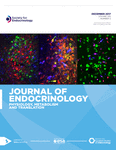Adrenocortical LDL receptor function negatively influences glucocorticoid output
- Division of Biopharmaceutics, Cluster BioTherapeutics, Gorlaeus Laboratories, Leiden Academic Centre for Drug Research, Einsteinweg 55, 2333 CC Leiden, The Netherlands
- Correspondence should be addressed to M Hoekstra; Email: hoekstra{at}lacdr.leidenuniv.nl
Abstract
Over 50% of the cholesterol needed by adrenocortical cells for the production of glucocorticoids is derived from lipoproteins. However, the overall contribution of the different lipoproteins and associated uptake pathways to steroidogenesis remains to be determined. Here we aimed to show the importance of LDL receptor (LDLR)-mediated cholesterol acquisition for adrenal steroidogenesis in vivo. Female total body LDLR knockout mice with a human-like lipoprotein profile were bilaterally adrenalectomized and subsequently provided with one adrenal either expressing or genetically lacking the LDLR under their renal capsule to solely modulate adrenocortical LDLR function. Plasma total cholesterol levels and basal plasma corticosterone levels were identical in the two types of adrenal transplanted mice. Strikingly, restoration of adrenal LDLR function significantly reduced the ACTH-mediated stimulation of adrenal steroidogenesis (P<0.001), with plasma corticosterone levels that were respectively 44–59% lower (P<0.01) as compared to adrenal LDLR negative controls. In addition, LDLR positive adrenal transplanted mice exhibited a significant decrease (−39%; P<0.001) in their plasma corticosterone level under fasting stress conditions. Biochemical analysis did not show changes in the expression of genes involved in cholesterol mobilization. However, LDLR expressing adrenal transplants displayed a marked 62% reduction (P<0.05) in the transcript level of the key steroidogenic enzyme HSD3B2. In conclusion, our studies in a mouse model with a human-like lipoprotein profile provide the first in vivo evidence for a novel inhibitory role of the LDLR in the control of adrenal glucocorticoid production.
- Received in final form 26 June 2015
- Accepted 1 July 2015
- Made available online as an Accepted Preprint 1 July 2015
- © 2015 Society for Endocrinology











